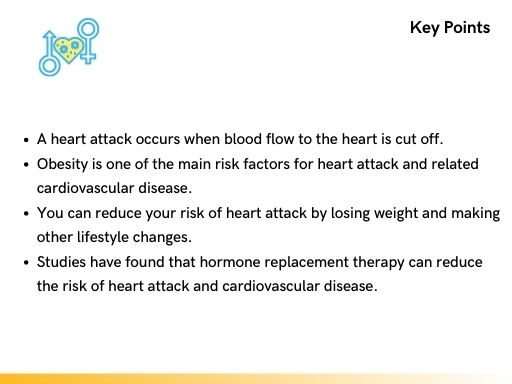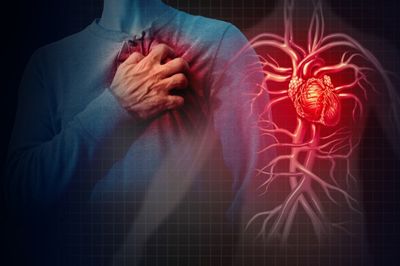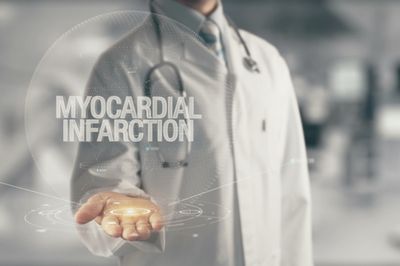 A heart attack is a sudden cardiac event characterized by blocked or severely restricted blood flow to the heart.
A heart attack is a sudden cardiac event characterized by blocked or severely restricted blood flow to the heart.
A heart attack is also called a myocardial infarction.
In the United States, over 800,000 people have a heart attack each year. According to the CDC, someone has a heart attack every 40 seconds. The majority of these people are obese.
Half of all heart attacks result in death. Immediate treatment is needed to prevent fatality. Call 911 if you or someone you are with appears to be having a heart attack.
What Is a Heart Attack?
A heart attack occurs when blood flow is restricted or completely blocked to the heart. That reduced blood flow is almost always a result of one of the main complications of obesity – blocked or clogged arteries – a condition known as atherosclerosis.
This type of Coronary artery disease (CAD) is the number one cause of heart attack. A less common cause is a severe spasm, or sudden contraction, of a coronary artery that can stop blood flow to the heart muscle or severe injury or trauma to the chest, as can occur in an automobile accident.
What Happens During a Heart Attack?
During a heart attack, blood is cut off from the heart muscle causing it to spasm or contract suddenly.
The longer that blood flow is restricted, the greater the damage to the heart muscle. Untreated, a heart attack can lead to cardiac arrest, unconsciousness, and death.
How To Recognize a Heart Attack?
 The signs and symptoms of a heart attack vary from person to person; however, the most common signals that you may be having a heart attack include:
The signs and symptoms of a heart attack vary from person to person; however, the most common signals that you may be having a heart attack include:
- Chest pain that may feel like pressure, tightness, pain, squeezing, or aching
- Pain or discomfort that spreads to the shoulder, arm, back, neck, jaw, teeth, or sometimes the upper belly
- Cold sweat
- Fatigue
- Heartburn or indigestion
- Lightheadedness or sudden dizziness
- Nausea
- Shortness of breath
Some heart attacks strike suddenly without warning, others may take time to build up and start with mild symptoms that can be mistaken for indigestion, and still, others are what doctors call “silent heart attacks” that could have occurred, and you not even know it, until the damage is revealed through an electrocardiogram or other test.
What To Do If You Have a Heart Attack?
If you or someone you know is exhibiting symptoms of a heart attack, you must get emergency help ASAP. If you can, proceed to the nearest ER or call 911. The sooner you get emergency treatment, the sooner blood flow can be restored, and the less damage to the heart will occur.
Heart Attack Causes
The main cause of heart attack is coronary artery disease. This is a buildup of fatty deposits known as plaque in the arterial walls of the arteries that supply blood to the heart. The buildup in plaque is caused by poor diet, lack of exercise, and high cholesterol.
As the blood vessels leading to the heart are narrowed due to arterial plaque, blood flow to the heart is reduced, and a heart attack can result. Sometimes, a piece of the plaque can break off, cause a blood clot, and completely cut-off blood supply to the heart, resulting in sudden cardiac arrest, or SCA. SCA is the most severe type of heart attack and could result in death very quickly if heroic rescue measures such as CPR or Automatic Defibrillation are not taken immediately.
Risk Factors for Heart Attack
Obesity and a sedentary lifestyle are the main risk factors for heart attack and coronary artery disease. Other risk factors include:
- High blood pressure
- High “bad” blood cholesterol
- Smoking
- Diabetes
- Lack of exercise
- Low testosterone
- Age
- Family history
What You Can Do to Prevent a Heart Attack
The best way to prevent heart disease or a heart attack is to adopt a “heart-healthy” lifestyle. You can do this by:

- Eating a diet rich in leafy vegetables, whole grains and low in fats
- Get more exercise
- Quit smoking
- Reduce your consumption of alcohol
- Take measures to reduce stress
- Get a good night’s sleep
- Manage your diabetes if you have the condition
- Try to maintain a healthy weight
If you are over 45, especially a male, you may want to get your testosterone level. Low testosterone has been shown to increase your risk of heart attack. If you have low testosterone, testosterone replacement therapy may reduce this risk.
Can HRT Help Prevent a Heart Attack?
It was once thought, particularly in women, that hormone replacement therapy increased the risk of heart attack. We now know that the exact opposite is true. Hormone replacement therapy – particularly testosterone replacement – in both men and women, improves heart health and actually reduces the chance of heart attack, stroke, and cardiovascular disease.
HRT improves heart health, reducing the risk of heart attack in several ways. HRT can help mitigate many of the risk factors involved in heart attacks by:
- Reducing obesity
- Lowering blood pressure
- Improving lipid metabolism, thereby reducing the buildup of arterial plaque
- Reducing “bad” cholesterol levels
- Helping to reduce fat and build lean muscle, which further improves metabolism
- Improving sleep
- Reducing stress and anxiety
How Is a Heart Attack Treated?
Immediate treatment for a heart attack may include rescue measures such as CPR or the employment of an Automatic Electronic Defibrillator (AED) if the victim has lost consciousness.
Otherwise, upon arrival to the ER, as long as the heart is deprived of blood, it is deprived of oxygen, and cardiac tissue dies. So, oxygen will be immediately given to someone having a heart attack. Beyond that, treatment will be based on how severely the blood flow to the heart is blocked.
Simple aspirin may be given to help break up blood clots, and stronger “clot busters, known as thrombolytics or fibrinolytics, may also be given, as could be other blood thinners. Other drugs given may include:
- Nitroglycerin
- Morphine
- Beta-blockers
- ACE inhibitors
- Statins
Any and all of these drugs can be given in the ER and then also prescribed to be taken on a regular basis to prevent future heart attacks. Depending on the extent of the damage and blockage, open heart surgery, such as coronary artery bypass, may be necessary.
How To Recover After a Heart Attack?
 Depending on the severity of the heart attack, recovery could be short or long-term. Recovery could take weeks or months. However, if timely intervention occurs, most people who survive a heart attack are able to eventually return to work and their normal daily routines.
Depending on the severity of the heart attack, recovery could be short or long-term. Recovery could take weeks or months. However, if timely intervention occurs, most people who survive a heart attack are able to eventually return to work and their normal daily routines.
How long your particular recovery takes depends on several factors, including:
- How extensive the heart attack was
- How quickly you got help
- If you required surgical intervention
- Your age, weight, and overall health
You may have to reduce your activity level for a bit while recovering, but soon after, physical activity will be encouraged, as will be making the kinds of lifestyle changes mentioned above to help you recover and prevent another heart attack.
Conclusion
Both men and women over the age of 45 are at risk of cardiovascular disease and sudden cardiovascular events such as heart attack or stroke. The loss of hormones that occurs as men and women age only increases this risk.
A heart attack can be quite serious. Almost half of those suffering a heart attack do not survive, and even in those that do, heart attack can lead to lifelong medical complications.
It is much easier to prevent a heart attack than to survive one. If you are over 45, now is the time to take measures to reduce your risk of heart attack, one of which may be to have your hormone levels checked and see if you are a candidate for hormone replacement therapy.
Frequently Asked Questions About Heart Attacks
How common are heart attacks?
Heart attacks are very common in the US, with about 806,000 occurring every year, according to the latest CDC statistics.
Is acute coronary syndrome the same as a heart attack?
A heart attack is one of several conditions that are a type of acute coronary syndrome. Acute coronary syndrome is a term used to describe any conditions associated with sudden, reduced blood flow to the heart.
Who is most at risk for a heart attack?
People over 45, who are obese, and suffering from other heart disease or metabolic conditions such as diabetes, high blood pressure, and coronary artery disease, are at the greatest risk of heart attack.
What are the complications of a heart attack?
Since a heart attack stops the flow of blood and oxygen to the heart, it can result in many severe complications, even death. A heart attack always results in some damage to the heart muscle; depending on the extent of this damage, it can permanently impair your heart’s ability to pump blood properly, which could necessitate things like a pacemaker, internal defibrillator, and even the eventual need for a heart transplant. After a heart attack, you can also be at greater risk for stroke, other forms of heart disease, and kidney disease.

